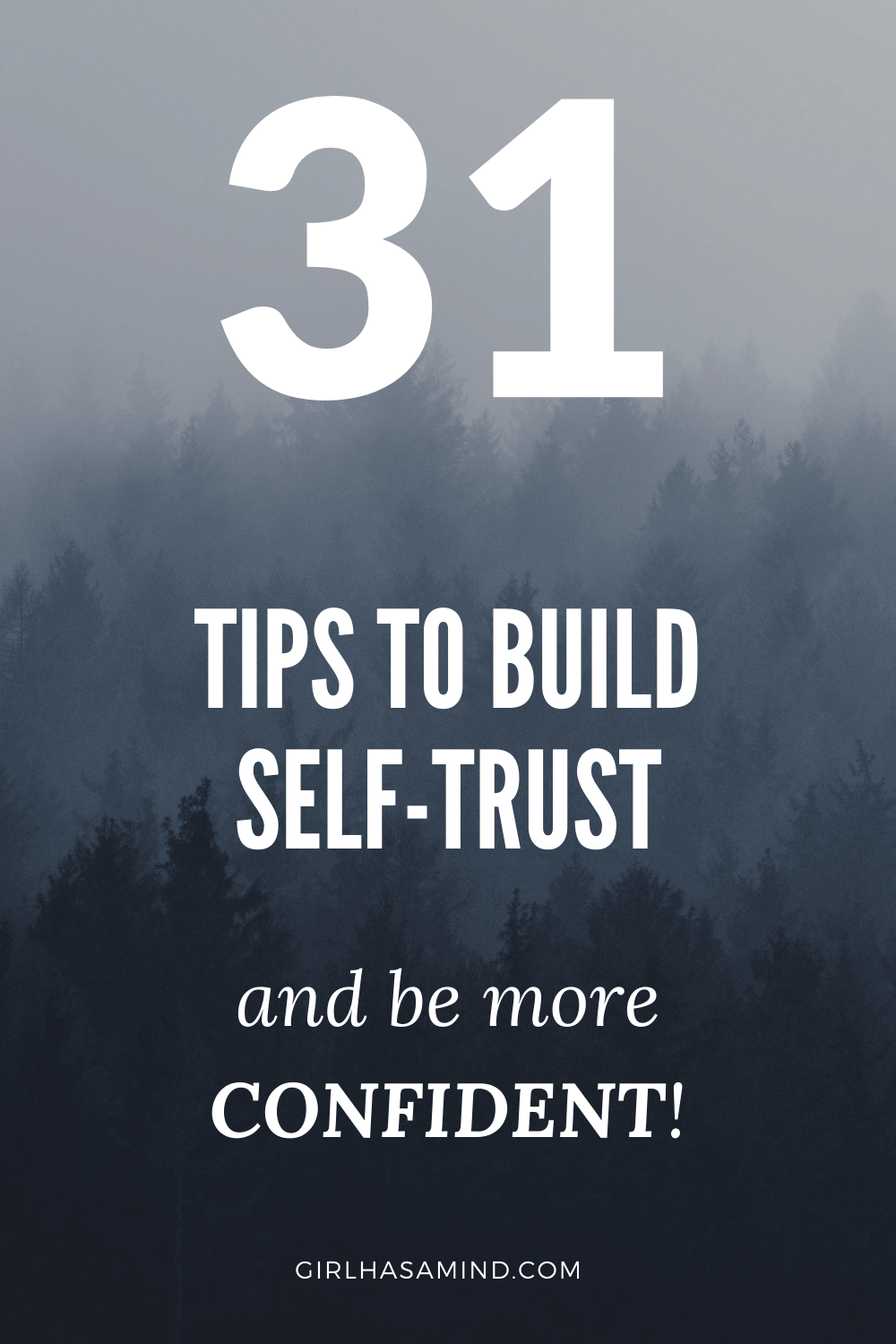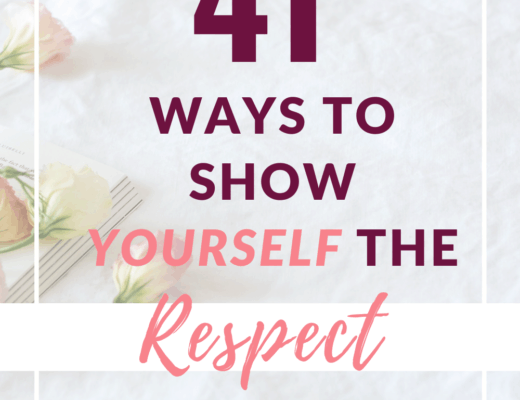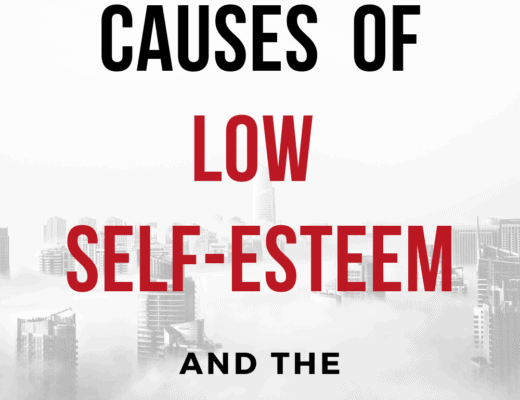Today we take a look at self-trust, what it means, why trusting yourself is so important, and how to build more self-trust.
As a child, we were never taught to trust in ourselves, in fact, we were never taught HOW to THINK!
We were taught how to be dependent on the adults around us, then we muddled through figuring out how to grow up as we went along.
But trusting yourself, the decisions you make, and why you make them, will not only make you stronger, but your life will become easier and more peaceful.
Trusting yourself and self-confidence goes hand in hand.
Those people who lack trust in themselves also lack self-confidence in many areas of their lives.
It infects not only your future decisions, but makes you over analyze past decisions, creating self-doubt and negativity.
But when you learn to trust your own judgement, you can start to create and build a life that you can be proud of.
You will have more fun, more success, better relationships, healthier habits, and greater happiness and peace.
Related Posts
What does self-trust mean?
The Merriam Webster Dictionary defines self-trust as “great faith in oneself or one’s abilities”.
The Oxford English Dictionary defines self-trust as “Trust in one’s own abilities, qualities, or judgement”.
Self-trust simply means that you trust yourself to make the right decisions for your own life, or that you have what it takes to see a goal or project through, even though you might not necessarily have the required skills yet.
It also means trusting your own emotions and feelings when you are in a situation or meeting someone.
Every time you feel uncomfortable, that’s your subconscious or inner voice giving you a signal that this is not a healthy situation for you to be in.
Really, self-trust is simply treating yourself with kindness and respect, and with the understanding that you can’t be perfect or know all the answers all the time. It means having faith in yourself, that you can do something, even when you don’t necessarily have all the skills or experience yet. Because you believe that you have what it takes to figure it out as you go along.
The importance of self-trust
So you can see why self-trust is important.
It’s our early warning system for toxic situations or relationships.
It helps us fulfil our dreams, make better decisions and gives us the confidence to say no to situations or people.
Without self-trust, we would be second guessing ourselves at every opportunity, we would let people walk all over us (because we ignore the inner voice telling us this is an unhealthy relationship) and we would never build or achieve anything as we would be too scared that we simply don’t have what it takes to be successful.

How do you build trust in yourself?
Here are some great tips to help you build trust in your own judgement so you can make better decisions for your own life and future.
1. Be yourself
Don’t pretend to be someone else.
Pretentious people are easy to spot. Moreover, we instinctively see them as superficial and untrustworthy.
But more importantly, when we live in a way that is not true to ourselves, it creates conflict in our hearts and minds which will manifest itself in some form of mental health issue like anxiety or depression.
2. Set reasonable achievable goals
When you aim too high and fail, you end up criticising yourself. You feel like a failure. It’s demotivating, so you give up and you avoid trying again in the future.
However, achieving various goals, big or small, is a great way to build confidence and trust in yourself.
So make them achievable!
If you have to, break down a bigger goal into smaller actionable and achievable goals.
For example, if you want to save $1m and retire young, you will have to start with smaller goals you can achieve. Each goal will build on another, and another. Don’t try to save $50k the first year, unless you are on a really high salary, that will be a shock to your lifestyle and it’s unlikely you will succeed. In year one perhaps the goal is to pay off all your debts, year 2, become used to cooking all your own meals to take to work to save on lunch, year 3, save $500 per month. You get the idea.
When we set goals, then fail to achieve them, it can really impact our confidence and self-trust negatively. We start to second guess and criticize ourselves and self doubt creeps into our decision making process, which ultimately leads us to believe that we are a) not good enough to achieve something, or b) or not smart enough to make good decisions.
Either way, this holds us back in life, we stop making any decisions, we spend all our energy examining our daily choices, words or interactions with others, and ultimately, we stop living a healthy life full of friends or growth.
3. Be kind to yourself
Never say anything to yourself you wouldn’t say to a small child.
In other words, stop bullying yourself with mean comments.
4. Build on your strengths
While you should build out your weaknesses, you should build on your strengths.
When you build on your strengths you increase your experience, skill set and knowledge until you become an expert in a subject.
Not only will this make you feel good, but it will make you feel more confident and it will increase the trust you feel towards your own abilities and decisions.
5. Spend time with yourself
This doesn’t necessarily mean mindfulness or meditation.
You can spend time by yourself doing a hobby. Some hobbies can be done solo, while part of a group. Painting classes might take place in a group setting, but in the end, you have to do your own painting by yourself.
6. Enjoy time by yourself
Following on from above, if you don’t enjoy time by yourself, you will not get any benefit from it.
For extroverts, this is often a problem, as they get their energy from others.
But there are many activities and hobbies you can try that will give you some time by yourself that will be relaxing and enjoyable.
I know when I go for a run, it’s as if my mind finally relaxes and lets go of all the worries and anxieties it’s been carrying around.

7. Learn to listen to your inner voice / subconscious
The previous 2 points bring us to this one.
It’s crucial to spend time alone being quiet.
You will be surprised how much your subconscious or inner voice can tell you about yourself if you can get quiet enough to listen.
That “gut feeling” you get sometimes…that’s your inner voice telling you something.
But we have a bad habit of using reason to override that gut feeling/inner voice.
Meditation or mindfulness gives you an opportunity to connect with your own inner self so you can understand what you really want, and what is really making you feel happy or miserable.
8. Be decisive
Yes you can read one more book.
Yes you can go on one more course.
Yes you can talk to your mentor again and again for the next 2 years.
But honestly, there will never be “the right time” to get started.
You will never have all the knowledge you need to be successful.
The only way to achieve anything in life is to START.
So make the decision to start, and the rest you will learn along the way.
I have taken a few courses over the years about blogging and building your own business. Some of them were really expensive. Yet in every course, there were always a few people who thought if they did one more course then suddenly they would get it. So they would spend thousands of more dollars on another course that probably just teaches them the exact same thing using some different words or pictures. In the end, all they’ve achieved is to have an empty wallet with nothing to show for it. While everyone else has gone ahead and started their blog/website/business already, made some mistakes, learned lots of things along the way, grown as human beings, and gotten closer to their goals.
Sometimes you just have to put your faith in yourself and take that first step into the unknown.
9. Stop second-guessing yourself
Hindsight is 20-20 they say.
Well, you can’t go back in time and make a different choice.
You can only go forward with what you have now.
You made a bad choice, you wish you’d made another one, but you can’t.
All you can do is live with the choice you made and LEARN from it so you don’t make it again.
To be honest, I learned more from my regrets than those things that went well.
One of my biggest regrets over the years has been that I didn’t start sooner. But I can’t go back in time and start my business a few years early. All I can do is make sure that I make the best of every opportunity I am given going forward so I don’t feel regret again 2 or 5 years from now.
In addition, looking back at the reason I delayed taking that next step, I find that at the time I didn’t think I had what it takes to achieve my dreams. I thought I had to gain more knowledge first, or that owning my own business simply wasn’t for me.
Looking back now, I see that I have barely any more knowledge now than I did back then, but what I do have now is trust and faith in myself and my own abilities.
I might not yet know how to accomplish a task, but I have learned I am strong enough to figure it out as I go along.
As a result, the success I now enjoy has nothing to do with skills or knowledge, and everything to do with confidence and trust in my own abilities and resilience.
10. Write down all the things you like about yourself
It’s extraordinary how much we constantly criticize ourselves. In fact, the mind is constantly busy listing all the things we are bad at.
However, that constant criticism can really impact our own self confidence and trust, and we get to the point where we can only see those negative things, we forget about the positive in our lives.
Make a concerted effort to remember things you actually like about yourself.
It will reset your mindset and remind you how great you really are.
11. Keep a list of all the positive things people say about you
If someone says thank you, write it down.
If they say you are really helpful, write it down.
People say positive things to us all the time, but because it’s not necessarily a compliment, we forget about it immediately.

12. Keep a list of all the compliments you’ve received
I actually have a folder in my inbox where I save all emails or comments sent to myself or my manager where I or the team gets any positive feedback from our various stakeholders.
It’s good to look back over the years to see how well we did.
The key for this point and the one above, is to become more aware of all the things you are good at, are doing right, and others admire about you. This fills your mind with more positive thoughts which ultimately will help you in trusting yourself.
13. Push past your comfort zone
As humans we feel a great sense of satisfaction and achievement every time we overcome a challenge.
Challenges are a great way to push outside your comfort zone.
It allows us to grow as human beings, increases our confidence, makes us stronger, wiser and more resilient, and overall, happier.
And every time you overcome a challenge or successfully push your boundaries with great results, it will increase your confidence in your own abilities, which in turn will increase the trust you have in your own self.
14. Give yourself a pass when you make a mistake
Work on gaining a growth mindset.
A person with a growth mindset believes that a mistake is just an opportunity to learn and grow.
In other words, you made a mistake only because you don’t yet know the right way to do something.
And the only way to learn the right way is through experience.
So forgive yourself and stop judging yourself.
15. Understand that when life gets hard, you grow more
Everyone grows and changes. It’s unavoidable. It’s also a good thing.
We do our most growth when faced with difficult life situations.
Instead of criticising yourself or blaming yourself, understand that it’s part of life and that you will grow immensely from it.
16. Keep perspective
For example, it’s not your fault when your relationship ends. There is nothing wrong with you!
Just like you are growing, so is the other person. And sometimes that means you are no longer compatible.
17. Visualize your future and set real goals
Knowing what you want for the future will help you achieve it.
However, if you are just drifting with no goals, you probably will never achieve it.
18. Work at your communication skills
Honestly, the amount of misunderstandings that have happened due to the use of words is astonishing.
What we say and what the other person hears are often 2 different things.
Plus then we also make assumptions on WHY the other person said what they did.
And before you know it you are having an argument with someone over something you both really agree upon.
Just look at every relationship you have ever been in and every argument you have ever had and you’ll see how words can be twisted into something completely different than how you intended them to be understood.
Learning to say things in a way that someone else can hear and understand through the lens of their own life experiences will save you a lot of trouble and heartache.
19. Manage your expectations
If it was easy and quick, everyone would have done it by now.
Real results take time, often years.
It’s those who stick with the boring tasks who become a success.
So decide what you want in life, make a plan, then stick with it.
You will have to remind yourself repeatedly as time goes by what you are trying to achieve, why you are trying to achieve it, and that it will take time.
20. Forgive others
They are just human and just like you they are more preoccupied with their own lives than you.
They are NOT out to get you or screw you over.
21. Be courageous – make yourself vulnerable
It’s amazing how freeing it is to become more open emotionally.
It’s scary, but ultimately you feel so much lighter and freer afterwards.
We all think that being vulnerable makes us weak, but I have repeatedly found the opposite to be true.
I don’t quite know why, but when you are willing to make yourself vulnerable and open up about your deepest and darkest feelings to other people, you become stronger, not weaker.
Not only that, but other people instinctively perceive you to be a strong person and they admire you for your courage.
22. Keep track of your achievements
Remember that thing you worked so hard for last year?
No?
Let’s be honest, human memory is terribly inefficient.
We remember things that didn’t happen, we forget things that did.
Keep track of all your achievements so you can use it to remind yourself just how much you have grown already.
23. Learn what drives your moods
Why do you feel more negative some days than others?
Why does someone upset you one day with a throwaway comment, but on another day you find it funny?
Understanding what drives your moods will really help you build trust in yourself.
24. Discover your values
Often we change ourselves to fit into our environment, we bend to peer pressure.
Learn and discover what your real values are and adjust your life accordingly.
This might mean losing some friends, but that’s OK.
25. Never lie to yourself (or others)
Don’t lie to yourself.
It achieves nothing except inner pain.
The truth is that your inner voice, your subconscious, can only speak the truth. So when your conscious mind tells a lie it creates an internal conflict.
For example:
Subconscious mind: “This person is not treating me with kindness and respect. I hate how they make me feel”.
Conscious mind: “This person tells me all the time they love me so it must be true. I must just be imagining things. The problem lies with me”.
The two thoughts cannot exist together and will create this internal conflict that will eat at you the more you try to suppress that inner voice.
Therefore it is really important to examine your thoughts and beliefs to ensure you don’t lie to yourself.
Because the more you lie to yourself, the more your subconscious learns that you (your conscious mind anyway) cannot be trusted. You are in effect teaching yourself NOT to trust yourself.
Being able to face and accept our faults, mistakes, idiosyncrasies and weaknesses will help you overcome perfectionism and build trust in yourself.

26. Spend time visualizing things working out exactly as you want them to
Visualization remains a tool used by all successful people and even athletes.
Not to be confused with day-dreaming, although you should definitely do some of that too.
Visualizing helps us to really focus on what we want, and how to achieve it. It will help you avoid unnecessary mistakes which can rock your confidence and impair your ability to trust yourself.
27. Experiment on yourself / your own life
Sometimes when we are afraid of something we will avoid it at all costs. We simply cannot overcome the fear that we feel.
Instead, deliberately see it as an experiment. The trick is to do something with the express purpose of finding out what will happen, exactly like a scientist would. In other words, deliberately enter a situation without any preconceived notions of how it will turn out.
For example, you are afraid of public speaking.
Technically you know you will not die if you do it. And you see that no-one laughs at other people when they do it.
So do an experiment simply to see what will happen, how will people react to you, and how will you feel afterwards.
You can do this by volunteering to do a small presentation to only 1 or 2 people in a meeting room, preferably managers or someone higher up in the company than you. In other words, not your peers.
Note how they react, how you feel before, during and after. Write a detailed report for yourself to refer to in future.
Without a shadow of a doubt, you will come out of it feeling you’ve just run a marathon, flooded with adrenaline, but also, YOU WILL BE OK!
No-one laughed at you, no-one threw popcorn at you, no-one said anything derogatory.
You didn’t die, the earth didn’t swallow you up and lightning did not strike you down.
Take that knowledge and examine how that makes you feel and how it changes how you see yourself.
The key is that you are deliberately forcing yourself to experience something without any preconceived ideas on how you will feel.
Too often we think we don’t like something, or that we are bad at something. So we avoid the experience altogether without EVER even having tried it.
It really drives me nuts how many people have convinced themselves they cannot do something, not based on a bad past experience, or any experience at all. For some reason, they just decided that they can’t do it.
Don’t be that person that gives up before you’ve even tried!
28. Embrace your mistakes
Humans are not perfect. Neither are you.
We all make mistakes. The trick is to learn from our mistakes and not make them too many times.
29. Stop making it about yourself
When someone goes wrong, it’s very easy to assume it’s our fault, or that we somehow could have affected the outcome if only we had made another choice/said some different words, etc.
Stop!
Bad things happen to good people all the time.
You didn’t cause it.
It’s egotistical to assume you are special in some way to attract such bad karma!
30. Avoid snake pits
Some people are snakes.
Spending time with them is the equivalent of being in a snake pit, which is to say, you are going to get bitten one way or another.
Or to put it more succinctly, avoid people who make you feel ugly or small.
This includes anyone who disrespects you, or mistreats you, takes you for granted, is mean to you or demeans you in public (or private).
31. Surround yourself with healthy relationships
They say dress for the job you want. Or fake it till you make it.
Well, I say that you should make friends for the lifestyle you want.
In other words, if you want a life where you have a good job where you are happy and respected, go on regular holidays, or have a degree or even a masters or bachelors, then you need the type of friends that also want those things.
If you surround yourself with friends who take drugs and drop out of school, you probably will become someone who takes drugs and drops out of school.
If you surround yourself with entrepreneurs who want to start their own businesses, you are far more likely to also become a successful entrepreneur with your own business.
Your thoughts and behaviour will change to match that of your peers, so if you hang out regularly with people who are confident and who trust in their own abilities, you are far more likely to also become confident and self trusting!
Conclusion
Learning to trust yourself will take time.
It’s crucial that you remind yourself of this when you start to feel negative and doubtful.
There is a certain element of discipline involved, ie, you have to take the time to make the effort to examine your negative emotions so you can put them into perspective.
But as long as you are prepared to put in a small amount of effort, the results will not only be fantastic, but very rewarding.
In my own personal life, I think of self-trust as having faith that every decision I make is ultimately for my own good, even though sometimes the outcome appears negative.
I’ve realized over the years that (as cliché as this sounds) everything that happens to me happens for a reason. And I’ve also come to understand that things happen FOR me, not TO me.
It has helped me to build trust in my own judgements, decisions and even just faith that whatever bad thing appears to be happening to me right now, will ultimately work out for the best in the long run.




